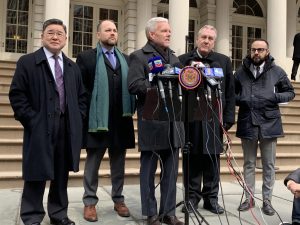By Maya Dower-Johnson
New York City Councilmembers who represent Queens held a press conference at Manhattan’s City Hall on Thursday to discuss egregious conditions of the 7-train line, as well as other horrendous MTA locations in desperate need of repair.
After a piece of debris from the elevated 7-train tracks crashed down onto a vehicle for the second time in two weeks, Councilmember Jimmy van Bramer sprang into action, lashing out at the MTA via Twitter, calling out their failure to fix the dilapidated train station.
“Let me be clear: this is a public health crisis. This is an emergency,” van Bramer said. “When you have beams of wood flying through windshields of occupied cars and you have jagged pieces of heavy metal that could decapitate human beings falling off the 7-train, we as a city should be responding.”
Van Bramer insisted the MTA should be doing everything in its power to make sure that debris falls like those never happen again. They MTA should have expended energy after the first incident to make sure there would not be a second one.

Peter Koo, Corey Johnson, Jimmy van Bramer (speaking), Daniel Dromm, Francisco Moya. Credit: Maya Dower-Johnson.
“If you were there yesterday in Woodside, Queens,” said van Bramer, “you would’ve seen what I saw, which is tons of jagged pieces of metal easily falling down to the street after workers simply touched them. That’s how loose they were. How did the MTA inspect that station and all up and down? And how are we supposed to have confidence that this isn’t going to happen again?”
The councilmember warned that death could be waiting. “The only reason people haven’t died yet is luck,” van Bramer said. “Luck is what has kept people from dying. But we’re not going to keep getting lucky. Next time something falls, it might not crack a windshield, it might crack somebody’s head open on Roosevelt Avenue.”
It is not acceptable, nor is it normal that pieces of this station are continually falling down onto the neighborhood residents. Sadly, this has happened many times before and nothing still has not been done about it.
“The MTA must act before someone dies, before a child is killed crossing the street, before a senior is killed going shopping in the supermarket,” van Bramer said. “That is going to happen unless the MTA gets it right.”
The last time Councilmember Daniel Dromm could remember the 7-train line being painted was in 1981, 38 years ago, which shows the MTA’s neglect, he said. Dromm said he’s reached out to several officials but maintained that no one has paid attention.
“That paint is 44 times the acceptable level for lead paint. It falls down all the time, every day,” Dromm said. “That dust is permeating the air. Western Queens has the highest level of lead poisoning in all of Queens.”
Councilmember Francisco Moya also spoke at the press conference. He said that communities of color have consistently been neglected by the MTA. He also shared that he’s been funding money to the MTA for several years in order to have them paint the train stations in his district of Corona and Jackson Heights. However, instead of doing just that, the money was taken and allocated to other stations, leaving his district still in need of basic maintenance.
“Enough is enough,” said Councilmember Peter Koo. “The MTA needs to fix this failing system and stop putting our residents in danger.”
Newly-elected Public Advocate Jumaane Williams joined in the criticism. “Just because no one hasn’t died yet, doesn’t make it any less of an emergency,” Williams said.
“There is no accountability,” said Council Speaker Corey Johnson, who has been pushing for the city to be given control over the MTA. “The governor controls the MTA, but we need singular responsibility and accountability. When situations like this occur, it shows why this is so important.”
Mayor Bill de Blasio is in the process of introducing his new plan to fix the MTA. That is called congestion pricing. The money would come from charging vehicles that go into lower Manhattan. De Blasio says the congestion pricing would ensure approximately $1 billion and that the money would be used for signaling, track repairs and other needed upgrades.

Leave a Reply
You must be logged in to post a comment.